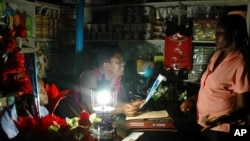Extended power cuts are on the rise in Uganda, with entire neighborhoods being plunged into darkness for days on end. Over the past month, an acute power deficit has led to extended electricity cuts across the country. Some homes, businesses and even hospitals are going without power for days at a time.
In the past week, frustrated shopkeepers in central Kampala blockaded roads and burned tires in protest. Some said they had been without electricity for four days, and that the cuts were crippling their businesses.
A woman who runs a printing business in the capital says she has lost a lot of money over the past several weeks.
“Last week we had power for just two days. It’s getting worse every day," she complained. "I am about to make redundant two members of staff, because there is no work. You lose customers, because every time they come in there’s no power. So we’ve lost customers. We don’t know where they do their printing.”
But, she adds, it is not just a question of losing customers. She says that the darkened streets and noisy generators have also been attracting thieves, who steal merchandise and rob pedestrians.
“When there’s so much noise they break into shops," she notes. "People cannot do business after 6:00 p.m., because the thieves are taking advantage. They used to open at six in the morning, but now the shopkeepers, they open shops around eight, because they can no longer walk to their workplace early enough because of the risk in the darkness.”
These extended power cuts are known as “load-shedding," which means cutting power to parts of the grid when there is not enough electricity to go around. The current power deficit is more than 100 megawatts a day.
Part of the problem is that several power plants have been shut down because the Ugandan government has failed to pay millions of dollars worth of bills. But recently damaged equipment has made the situation worse.
Uganda’s main energy distributor, Umeme, says the situation is not likely to improve in the near future.
“A fault occurred which caused a fire that damaged equipment at the substation," said Umeme spokeswoman Florence Nsubuga. "The equipment that was damaged cannot be replaced easily. The works require extensive input, whereby just unbundling the equipment would take some time.”
Uganda’s energy problem goes even deeper. Even with functioning equipment, Umeme is unable to meet the country’s needs. A government study earlier this year found that energy demand will most likely triple in the coming decade.
In order to bridge this energy gap, the Ugandan government has been focusing on developing hydroelectricity. Two dam projects - the Karuma Dam and the Bujagali Dam - are slated to begin operation in the next few years.
Kapil Kapoor, Uganda Country Manager for the World Bank, says this is where revenues from the country’s newfound oil reserves will most likely be invested.
“One of the biggest investments that they see happening in the next four or five years is the Karuma dam, which has possibly a capacity of six, seven hundred megawatts," explained Kapoor. "So what they would like to see is earnings for three or four years from oil all being parked into a fund, which will go to finance Karuma dam.”
Kapoor says that all the royalties the Ugandan government has earned so far from foreign oil companies - around $400 million - have been earmarked for future investment in the energy sector.
The Bujagali Dam is expected to be operational next year, supplying Uganda with up to 250 megawatts more power - enough to cover the current deficit. But until then, Ugandan businesses will be left struggling to make ends meet with the little power they have.
Power Cuts Hurt Uganda Businesses




